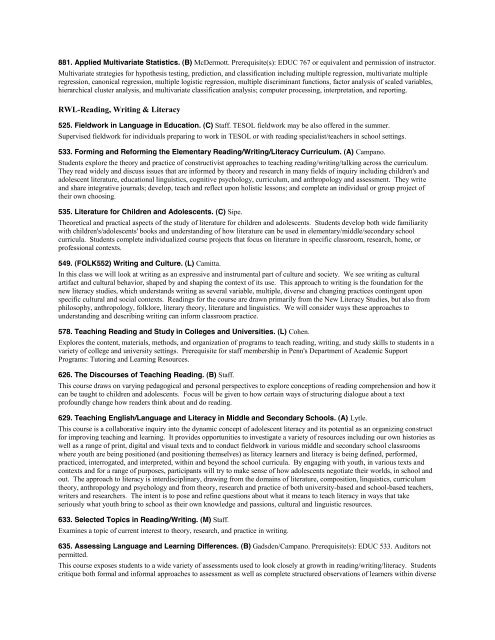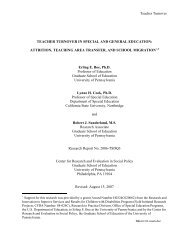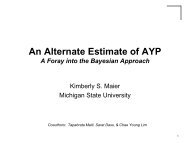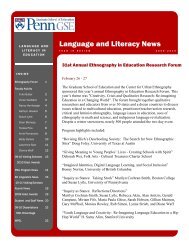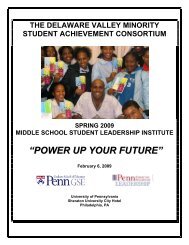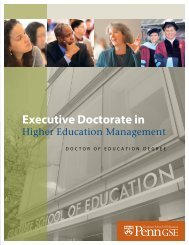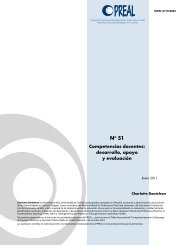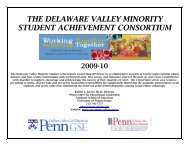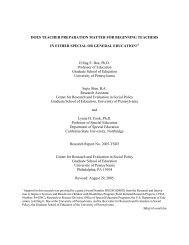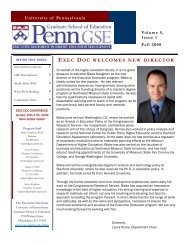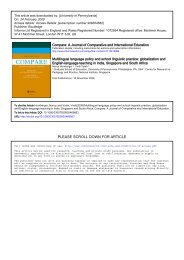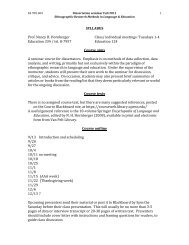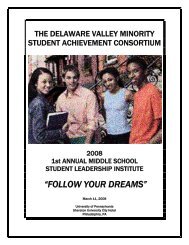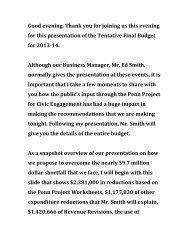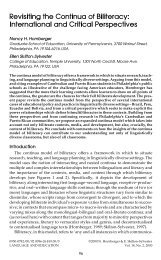EDUCATION (ED) {EDUC} - Penn GSE
EDUCATION (ED) {EDUC} - Penn GSE
EDUCATION (ED) {EDUC} - Penn GSE
You also want an ePaper? Increase the reach of your titles
YUMPU automatically turns print PDFs into web optimized ePapers that Google loves.
881. Applied Multivariate Statistics. (B) McDermott. Prerequisite(s): <strong>ED</strong>UC 767 or equivalent and permission of instructor.<br />
Multivariate strategies for hypothesis testing, prediction, and classification including multiple regression, multivariate multiple<br />
regression, canonical regression, multiple logistic regression, multiple discriminant functions, factor analysis of scaled variables,<br />
hierarchical cluster analysis, and multivariate classification analysis;; computer processing, interpretation, and reporting.<br />
RWL-Reading, Writing & Literacy<br />
525. Fieldwork in Language in Education. (C) Staff. TESOL fieldwork may be also offered in the summer.<br />
Supervised fieldwork for individuals preparing to work in TESOL or with reading specialist/teachers in school settings.<br />
533. Forming and Reforming the Elementary Reading/Writing/Literacy Curriculum. (A) Campano.<br />
Students explore the theory and practice of constructivist approaches to teaching reading/writing/talking across the curriculum.<br />
They read widely and discuss issues that are informed by theory and research in many fields of inquiry including children's and<br />
adolescent literature, educational linguistics, cognitive psychology, curriculum, and anthropology and assessment. They write<br />
and share integrative journals;; develop, teach and reflect upon holistic lessons;; and complete an individual or group project of<br />
their own choosing.<br />
535. Literature for Children and Adolescents. (C) Sipe.<br />
Theoretical and practical aspects of the study of literature for children and adolescents. Students develop both wide familiarity<br />
with children's/adolescents' books and understanding of how literature can be used in elementary/middle/secondary school<br />
curricula. Students complete individualized course projects that focus on literature in specific classroom, research, home, or<br />
professional contexts.<br />
549. (FOLK552) Writing and Culture. (L) Camitta.<br />
In this class we will look at writing as an expressive and instrumental part of culture and society. We see writing as cultural<br />
artifact and cultural behavior, shaped by and shaping the context of its use. This approach to writing is the foundation for the<br />
new literacy studies, which understands writing as several variable, multiple, diverse and changing practices contingent upon<br />
specific cultural and social contexts. Readings for the course are drawn primarily from the New Literacy Studies, but also from<br />
philosophy, anthropology, folklore, literary theory, literature and linguistics. We will consider ways these approaches to<br />
understanding and describing writing can inform classroom practice.<br />
578. Teaching Reading and Study in Colleges and Universities. (L) Cohen.<br />
Explores the content, materials, methods, and organization of programs to teach reading, writing, and study skills to students in a<br />
variety of college and university settings. Prerequisite for staff membership in <strong>Penn</strong>'s Department of Academic Support<br />
Programs: Tutoring and Learning Resources.<br />
626. The Discourses of Teaching Reading. (B) Staff.<br />
This course draws on varying pedagogical and personal perspectives to explore conceptions of reading comprehension and how it<br />
can be taught to children and adolescents. Focus will be given to how certain ways of structuring dialogue about a text<br />
profoundly change how readers think about and do reading.<br />
629. Teaching English/Language and Literacy in Middle and Secondary Schools. (A) Lytle.<br />
This course is a collaborative inquiry into the dynamic concept of adolescent literacy and its potential as an organizing construct<br />
for improving teaching and learning. It provides opportunities to investigate a variety of resources including our own histories as<br />
well as a range of print, digital and visual texts and to conduct fieldwork in various middle and secondary school classrooms<br />
where youth are being positioned (and positioning themselves) as literacy learners and literacy is being defined, performed,<br />
practiced, interrogated, and interpreted, within and beyond the school curricula. By engaging with youth, in various texts and<br />
contexts and for a range of purposes, participants will try to make sense of how adolescents negotiate their worlds, in school and<br />
out. The approach to literacy is interdisciplinary, drawing from the domains of literature, composition, linquistics, curriculum<br />
theory, anthropology and psychology and from theory, research and practice of both university-based and school-based teachers,<br />
writers and researchers. The intent is to pose and refine questions about what it means to teach literacy in ways that take<br />
seriously what youth bring to school as their own knowledge and passions, cultural and linguistic resources.<br />
633. Selected Topics in Reading/Writing. (M) Staff.<br />
Examines a topic of current interest to theory, research, and practice in writing.<br />
635. Assessing Language and Learning Differences. (B) Gadsden/Campano. Prerequisite(s): <strong>ED</strong>UC 533. Auditors not<br />
permitted.<br />
This course exposes students to a wide variety of assessments used to look closely at growth in reading/writing/literacy. Students<br />
critique both formal and informal approaches to assessment as well as complete structured observations of learners within diverse


